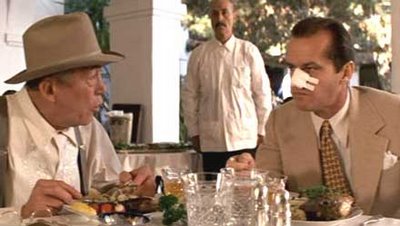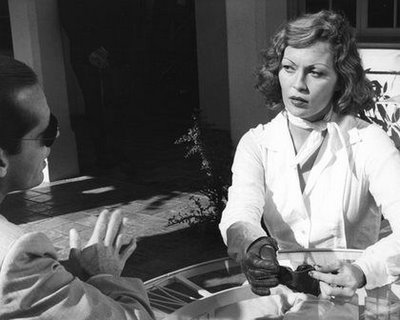 Chinatown - dir. Roman Polanski - 1974 - USA
Chinatown - dir. Roman Polanski - 1974 - USAPlease, if you haven’t seen Chinatown, don’t read this and run to your video store now (and to Josh, who rated the film 1 star on Netflix, try to win back my respect).
I really should know better. Instead of watching pieces of shit like Art School Confidential, I need to just revisit films that actually matter. No matter what your stance is on film versus video, one can’t deny the sizable appeal of home video. How else can one visit and revisit films like Chinatown whenever they want? You don’t have to pay to see the film repeatedly, nor do you have to wait for it to screen in your city. Chinatown, and other masterpieces, can be at your disposal whenever you want. I suppose everyone has films that can continuously amaze, astonish, and eventually break your heart. More than just a litmus test for whether I will like someone or not based on their opinion of Chinatown, Chinatown, for me, is the reason why I adore the cinema. The film, Polanski’s third film after the death of his pregnant wife Sharon Tate and his final American feature, works for me in a way other film noirs (especially the neo-noirs) do not. While I hold films like The Maltese Falcon, Pickup on South Street, and Double Indemnity in an extremely high regard, Chinatown has something that these films do not, and it’s something that’s difficult to pick up on a single viewing. Chinatown is, no doubt, a richly textured and layered film; in fact I find myself stumbling over words trying to explain the plot. Thankfully, plot details seldom matter in film noir (look at The Big Sleep if you really want to get lost). One can applaud L.A. Confidential or Brick on the grounds of cleverness and faithfulness, but can we give them praise for their dramatic achievements? I’d say no, though I would accept an argument for the Joseph Gordon-Levitt character as being a bit like Polanski himself. To prefer Chinatown to L.A. Confidential is not to declare one’s self a pessimist or an optimist; it runs deeper than that.
 Nicholson detractors, be advised: this ranks with Antonioni’s The Passenger as one of the least “Here’s Jaaaaaack” Nicholson performances. This is likely because he was under the direction of respected foreign auteurs, but I might argue that this is one of Nicholson’s best performances, for the very reason stated above. Though this is not a criticism, watching Chinatown once doesn’t hold the impact of multiple viewings. The film is assuredly plot-heavy in its dealings with the water department and corruption; at times, one even forgets why Faye Dunaway’s Evelyn Mulwray is still in the picture. But without her, Chinatown wouldn’t work on the level that affects me the deepest. Chinatown is all about J.J. Gittes and Eveyln Mulwray. Upon initial viewing, we’re as distracted as Gittes is. What is Evelyn hiding and why? Is she stringing him along like Barbara Stanwyck? Is everything that comes out of her mouth a bold lie like Mary Astor? Our questioning eye, thanks to the incredible singular point-of-view of Gittes by Polanski and screenwriter Robert Townes, doesn’t give Evelyn the sympathy that she so deserves, and it allows us to stray. Since this is after the heyday of noir, Evelyn doesn’t need to function as the cold, conniving femme fatale. This may be her exterior, but beneath the front, she’s a tortured soul, far more sad than the label of “sick woman” her father, Noah Cross (John Huston), gives her. The passion in Chinatown is real, not a sexual guise to achieve the seedy greed and fortune these noir spiderwomen so desire, which is what separates it from the rest. One also cannot really appreciate Faye Dunaway’s brilliant performance on a single viewing. Her performance is wildly complex, and Polanski allows her no trickery. We might assume her to be calculating, but this is only because of our prior cinematic knowledge, and Polanski and Townes play off that. Her frightened shutters and glances scream of a woman damaged, a woman with a dreadful, nearly unspeakable secret. Dunaway allows for the misinterpretation of her nervousness, and this is why she works so amazingly. We see her as Jake does, a mysterious beauty with something to hide. Only upon knowing the secret (which most people know without even seeing the film) does our opinion change. Her “sister, daughter” scene is so ruthlessly powerful, most people find themselves laughing to cover up their violent discomfort. The “sister, daughter” scene ranks among some of the most famous scenes in film history, and it could have been a complete disaster in the hands of a lesser actress. You’re probably screaming something about wire hangers right now, but under the direction of Polanski, there’s nothing remotely amusing about Faye Dunaway here. In fact, I kind of look away every time I see that scene. I can’t imagine another actress pulling that off, even though both Ali MacGraw and Jane Fonda were rumored to have been sought for the role of Evelyn. It may be rather bold of me to say this, but I honestly don’t believe Chinatown would have worked without her.
Nicholson detractors, be advised: this ranks with Antonioni’s The Passenger as one of the least “Here’s Jaaaaaack” Nicholson performances. This is likely because he was under the direction of respected foreign auteurs, but I might argue that this is one of Nicholson’s best performances, for the very reason stated above. Though this is not a criticism, watching Chinatown once doesn’t hold the impact of multiple viewings. The film is assuredly plot-heavy in its dealings with the water department and corruption; at times, one even forgets why Faye Dunaway’s Evelyn Mulwray is still in the picture. But without her, Chinatown wouldn’t work on the level that affects me the deepest. Chinatown is all about J.J. Gittes and Eveyln Mulwray. Upon initial viewing, we’re as distracted as Gittes is. What is Evelyn hiding and why? Is she stringing him along like Barbara Stanwyck? Is everything that comes out of her mouth a bold lie like Mary Astor? Our questioning eye, thanks to the incredible singular point-of-view of Gittes by Polanski and screenwriter Robert Townes, doesn’t give Evelyn the sympathy that she so deserves, and it allows us to stray. Since this is after the heyday of noir, Evelyn doesn’t need to function as the cold, conniving femme fatale. This may be her exterior, but beneath the front, she’s a tortured soul, far more sad than the label of “sick woman” her father, Noah Cross (John Huston), gives her. The passion in Chinatown is real, not a sexual guise to achieve the seedy greed and fortune these noir spiderwomen so desire, which is what separates it from the rest. One also cannot really appreciate Faye Dunaway’s brilliant performance on a single viewing. Her performance is wildly complex, and Polanski allows her no trickery. We might assume her to be calculating, but this is only because of our prior cinematic knowledge, and Polanski and Townes play off that. Her frightened shutters and glances scream of a woman damaged, a woman with a dreadful, nearly unspeakable secret. Dunaway allows for the misinterpretation of her nervousness, and this is why she works so amazingly. We see her as Jake does, a mysterious beauty with something to hide. Only upon knowing the secret (which most people know without even seeing the film) does our opinion change. Her “sister, daughter” scene is so ruthlessly powerful, most people find themselves laughing to cover up their violent discomfort. The “sister, daughter” scene ranks among some of the most famous scenes in film history, and it could have been a complete disaster in the hands of a lesser actress. You’re probably screaming something about wire hangers right now, but under the direction of Polanski, there’s nothing remotely amusing about Faye Dunaway here. In fact, I kind of look away every time I see that scene. I can’t imagine another actress pulling that off, even though both Ali MacGraw and Jane Fonda were rumored to have been sought for the role of Evelyn. It may be rather bold of me to say this, but I honestly don’t believe Chinatown would have worked without her. To scrape away the plot is to find Chinatown, both the film and the place. For Gittes, Chinatown is a bad memory. Chinatown, the location, quite literally becomes a personification of his loss, his own personal damage, and a reminder of why he is the staunch, cold Sam Spade of the film. Chinatown also becomes a black abyss of confusion, lawlessness, and a loss of control. The famous final line, “Forget it, Jake, it’s Chinatown,” sends chills down your spine. You’ve lost, just like Gittes has. Townes has always said that Roman changed the original ending from a happy one to the one that stands now: a bleak, miserable, wholly pessimistic explosion of a conclusion. Seldom do films elicit a physical reaction from me, but the sound of that damned car horn will always make my stomach sink… deep. So deep that just thinking about it has gotten my mind far off track in writing this. Chinatown, the film, is all about the doomed, tragic love affair between Gittes and Evelyn. More than that, it’s about the fucked up way things return to you; it’s a lot like Vertigo if you think about it, only Jack Nicholson has his guard up. He’s a tortured man who’s been rendered cold; James Stewart is a desperate man who’s been rendered obsessive. In a way, Vertigo ends happily. Order is restored, and James Stewart can continue with his life. It’s typical Hitchcock. The world of Chinatown is ruled by chaos and by the untouchable power of the wealthy. Order is certainly not restored; disorder has swooped around, like karma, to destroy Gittes again. I say this about Gittes because, as a viewer, we are him. We’re not Evelyn; she is our lost second chance. You can call Polanski an asshole if you so desire, but you can’t say his tragedy isn’t insanely beautiful and painfully haunting (for another example, see Macbeth).
To scrape away the plot is to find Chinatown, both the film and the place. For Gittes, Chinatown is a bad memory. Chinatown, the location, quite literally becomes a personification of his loss, his own personal damage, and a reminder of why he is the staunch, cold Sam Spade of the film. Chinatown also becomes a black abyss of confusion, lawlessness, and a loss of control. The famous final line, “Forget it, Jake, it’s Chinatown,” sends chills down your spine. You’ve lost, just like Gittes has. Townes has always said that Roman changed the original ending from a happy one to the one that stands now: a bleak, miserable, wholly pessimistic explosion of a conclusion. Seldom do films elicit a physical reaction from me, but the sound of that damned car horn will always make my stomach sink… deep. So deep that just thinking about it has gotten my mind far off track in writing this. Chinatown, the film, is all about the doomed, tragic love affair between Gittes and Evelyn. More than that, it’s about the fucked up way things return to you; it’s a lot like Vertigo if you think about it, only Jack Nicholson has his guard up. He’s a tortured man who’s been rendered cold; James Stewart is a desperate man who’s been rendered obsessive. In a way, Vertigo ends happily. Order is restored, and James Stewart can continue with his life. It’s typical Hitchcock. The world of Chinatown is ruled by chaos and by the untouchable power of the wealthy. Order is certainly not restored; disorder has swooped around, like karma, to destroy Gittes again. I say this about Gittes because, as a viewer, we are him. We’re not Evelyn; she is our lost second chance. You can call Polanski an asshole if you so desire, but you can’t say his tragedy isn’t insanely beautiful and painfully haunting (for another example, see Macbeth). The moral if this story, kids, is to respect your elders. Never turn down the opportunity for a revisit of the films that move you, even if it’s a Farrelly brothers comedy. True understanding of a film, even one less complex and wonderful as Chinatown, cannot come from one viewing (and, something, never comes at all). But it’s all in the attempt, isn’t it?
The moral if this story, kids, is to respect your elders. Never turn down the opportunity for a revisit of the films that move you, even if it’s a Farrelly brothers comedy. True understanding of a film, even one less complex and wonderful as Chinatown, cannot come from one viewing (and, something, never comes at all). But it’s all in the attempt, isn’t it?
No comments:
Post a Comment